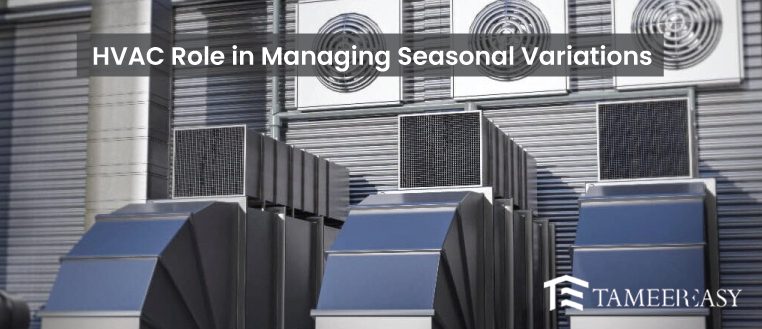Pakistan enjoys a variety of weather fluctuations all year round, from sweltering summers to bitterly cold winters. These extreme weather conditions significantly impact both residential and commercial buildings. Good indoor climate management ensures comfort, productivity, and energy efficiency.
This blog post will examine the critical function of HVAC (Heating, Ventilation, and Air Conditioning) systems in Pakistan’s seasonal change management. We will go over the main factors, advantages, and tactics for HVAC system optimisation to guarantee the best inside climate regardless of the weather outside.
Understanding HVAC Systems
Modern buildings require role of HVAC systems for heating, cooling, ventilation, and humidity management. They control the indoor climate to keep it at comfortable temperatures, with sufficient ventilation and good air quality.
HVAC systems are essential in Pakistan for adjusting to the constantly shifting weather patterns and assuring the safety of occupants. Let’s see how these systems successfully handle seasonal changes.
1). Cooling Solutions for Hot Summers
The summers in Pakistan can get very hot, with temperatures rising well above 40°C. HVAC systems offer effective cooling options to battle extreme heat. Air conditioning systems like packaged, split, or central air conditioners are frequently used to chill indoor spaces.
These systems function by eliminating heat from the air and distributing cool air throughout the building. Energy-efficient cooling systems, such as those based on inverter technology, have grown in popularity in recent years because of their capacity to provide a comfortable climate while consuming the least amount of energy possible.
2). Heating Solutions for Chilly Winters
Pakistan’s winters provide chilly weather, especially in the north. Heating and comfort are provided during these seasons by HVAC systems. Heating systems like boilers, furnaces, heat pumps, or radiators provide effective heating.
These systems disperse warm air or water to keep indoor temperatures where they should be. Heat pumps and condensing boilers are two examples of energy-efficient heating technology that can lower energy use and greenhouse gas emissions.
3). Ventilation and Air Quality Management
Proper ventilation is essential year-round to ensure clean air circulation and remove contaminants. Controlled ventilation keeps indoor heat and humidity levels down during the summer. Role of HVAC systems include ventilation components that bring fresh air from the outside while expelling stale air.
Effective industrial-level ventilation systems in the wintertime recover heat from the air being vented, increasing energy efficiency while maintaining air quality. To provide a healthy interior environment, air filtration systems and routine maintenance ensure the removal of airborne pollutants, allergens, and particulate matter.

Optimising HVAC Systems for Seasonal Variations
Several tactics can be used to maximise the advantages of HVAC systems in managing seasonal variations:
1). Regular Maintenance
HVAC equipment must be inspected regularly, cleaned, and serviced for maximum performance, energy efficiency, and durability.
2). Smart Thermostats and Zoning
Installing programmable or smart thermostats allows you to schedule and adjust the temperature precisely, maximising energy use. Zoning systems provide individualised comfort and energy savings by dividing the building into various zones with separate temperature management.
3). Insulation and Weatherization
The load on HVAC systems is reduced when walls, windows, and roofs are properly insulated to minimise heat transmission during the summer and heat loss during the winter.
4). Energy-Efficient Equipment
Energy consumption and operating expenses can be decreased by purchasing energy-efficient HVAC equipment, such as ENERGY STAR-certified units.
5). Building Automation Systems (BAS)
Building Automation Systems (BAS) BAS automates and optimises the operations of numerous building systems, including role of HVAC, to increase energy efficiency and occupant comfort.
6). Renewable Energy Integration
Supplementing HVAC energy needs with renewable energy sources like solar panels or geothermal systems can decrease the need for fossil fuels.
Conclusion
HVAC systems are essential for managing seasonal changes and guaranteeing ideal interior conditions in Pakistan’s constantly shifting environment. These systems deliver efficient cooling, heating, ventilation, and air quality control throughout sweltering summers and frigid winters. By utilising cutting-edge technologies, energy-efficient equipment, and clever tactics, HVAC systems may provide comfort while consuming less energy and having a smaller environmental impact.
Their performance is further improved by routine maintenance, insulation, and incorporation of renewable energy sources. Adopting these solutions improves building practises that are sustainable and energy-efficient while also improving occupant well-being. As Pakistan continues to endure various seasonal variations, HVAC systems are critical in ensuring a cosy and healthy interior atmosphere.








